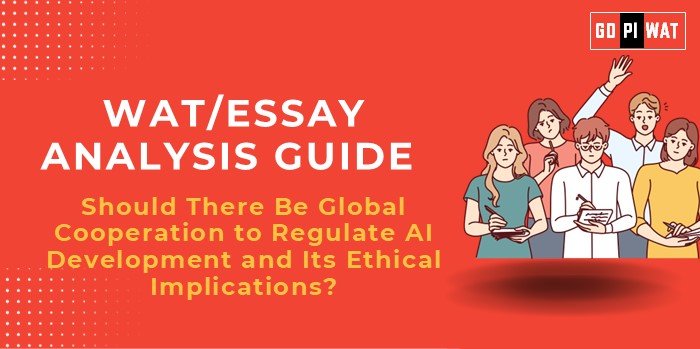📋 Written Ability Test (WAT)/Essay Analysis Guide
🌐 Should There Be Global Cooperation to Regulate AI Development and Its Ethical Implications?
💡 Understanding the Topic’s Importance
AI’s influence spans all sectors, making its regulation a critical topic. Ethical AI is vital to prevent societal harms like bias and unemployment while fostering innovation.
⏳ Effective Planning and Writing
- Time Allocation: 5 minutes for planning, 20 minutes writing, 5 minutes review.
- Preparation Tips: Note key statistics, stakeholders, and ethical dilemmas.
✍️ Introduction Techniques for Essays
- Contrast Approach: “While AI enhances healthcare and education globally, its unregulated growth risks ethical breaches and societal harm.”
- Solution-Based: “A global AI framework is crucial to align technological progress with human values and ethical principles.”
📑 Structuring the Essay Body
- Achievements: Highlight AI’s contributions to healthcare, education, and governance.
- Challenges with Comparative Analysis: Discuss biases, ethical breaches, and fragmented global policies.
- Future Outlook: Propose solutions like UN-led AI charters or international AI ethics councils.
🔗 Concluding Effectively
- Balanced Perspective: “Global cooperation is key to harness AI’s potential while addressing ethical concerns.”
- Global Comparison: “AI governance requires international collaboration akin to climate change frameworks.”
🔍 Analyzing Successes and Shortcomings
- Key Achievements: AI-driven healthcare and education advancements.
- Ongoing Challenges: Bias, weaponization, and uneven global adoption.
- Global Context: Learn from the EU AI Act and Canada’s ethical AI strategy.
✔️ Recommendations for Sustainable Progress
- Foster public-private partnerships for ethical AI initiatives.
- Create an international council for AI ethics and regulation.
📝 Sample Short Essays
1. Balanced Perspective:
“AI’s transformative power is undeniable, yet its ethical challenges demand urgent global action. Collaborative frameworks can ensure AI benefits humanity while minimizing risks.”
2. Solution-Oriented:
“Global AI regulation must prioritize ethical transparency and innovation. UN-led efforts can harmonize diverse policies, fostering trust and collaboration.”
3. Global Comparison:
“While Europe’s AI Act sets a benchmark, global cooperation can unify fragmented approaches, ensuring AI’s safe and equitable deployment worldwide.”


